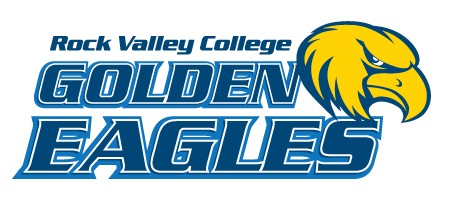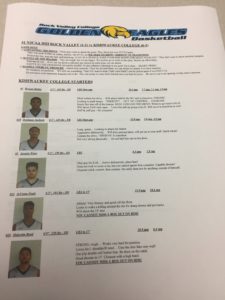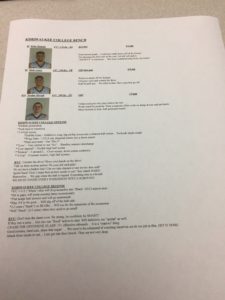How We Scout
Our scout work is something we take very serious at Rock Valley College. Between myself, my assistant (Brandon Gossett), and our student assistant (Ron Keller III), we get out to live scout and film as many games as possible. In addition, we will also do tape exchange with other schools so we can do our homework on each team that we play. Two days prior to a game, we will work on guarding specific action that we will see in our next game within the confines of us still improving as a program. For example, if a team we play runs a clear out ball screen continuity offense, we will break that down in practice, guard it, and in return, the offense gets better with ball screen reads as well. It is a double-sided advantage for our program.
What’s Included on the Scout
We schedule off roughly 30-45 minutes the day before each game to thoroughly go through a 2-page written report on game keys, personnel (top 7-8 guys), opponent offense/defensive concepts, and what we need to do to maximize our strengths as a program in that particular game. Typically, I will force the player who he is tentatively matched up with to read about his match-up. The information includes height, weight, stats, and strengths. When talking about closing out, we do it one of three ways: 1) Ray Allen (this guy is a SHOOTER! Do not let him get hot early or we are in trouble), LBJ (this guy can drive a bit and shoot a bit), or Rondo (close short and gap the drive as this is a non-shooter). I will read and go over everything else.
Upon completing the report, I will draw up sets on the dry erase board and quiz our guys on how we would guard the particular action. Once this is done, we watch film and our scout team guys (redshirts, non-rotational guys, and sometimes Coach Gossett) will head upstairs to go through the action of our opponent. We will watch particular sets and action for about 20 minutes as too much more in this setting can become overkill for our guys.
Practice Implementation of Scout
At the end of practice the day before a game, we spend 20 minutes guarding the main 4-5 actions of the upcoming opponent. Our scout team goes live. Our top 10 guys will have to rack up 3 stops guarding the action. Upon completion of this, our prep work is nearly complete. During shoot around (day of game), we go through the action of the opponent one last time. Before each game, our guys will have 1) guarded their main action and principles they look to take advantage of, 2) see the action drawn up, 3) discussed personnel, and 4) guarded the exact action on two separate occasions in back-to-back days.
Overall Scouting Philosophy
Ultimately, it comes down prior teaching. If you are strong in principle, in theory, you should not need a cheat sheet; however, having the opponent’s materials thoroughly laid out for the guys instills confidence in the game they are about to play. Additionally, with no principles, it makes the scout incredibly difficult to execute because the ideas are foreign. Proper scouting is an advantage. Having well-taught players who are bought in to preparation is a BIG advantage.


